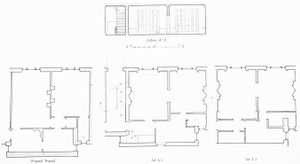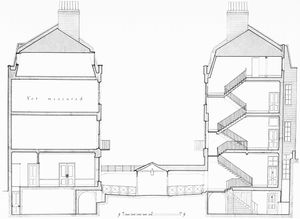The Albany: Difference between revisions
mNo edit summary |
No edit summary |
||
| Line 4: | Line 4: | ||
==The Building== | ==The Building== | ||
The building itself was originally a single three-storey block seven bays wide, with service wings at the front which faced each other across a courtyard. When the house was divided into bachelor apartments, and two new long buildings, of three storeys plus basement and attics, were built in what had been the back garden, with the upper floors of the original house also being divided up into sets. The ground floor of the original house provided a dining room overseen by a maître d'hotel, plus a bar and cold baths for the residents' use. The basements housed kitchens for the sets on the ground floor while the attics housed the kitchens for the upper two floors. The two new buildings behind the original house opened off a covered walk known as the Rope Walk, from its long straight design.<ref>See [http://www.british-history.ac.uk/survey-london/vols31-2/pt2/pp367-389#h3-0003 The Albany from British History Online]</ref> | The building itself was originally a single three-storey block seven bays wide, with service wings at the front which faced each other across a courtyard. When the house was divided into bachelor apartments, and two new long buildings, of three storeys plus basement and attics, were built in what had been the back garden, with the upper floors of the original house also being divided up into sets. The ground floor of the original house provided a dining room overseen by a maître d'hotel, plus a bar and cold baths for the residents' use. The basements housed kitchens for the sets on the ground floor while the attics housed the kitchens for the upper two floors. The two new buildings behind the original house opened off a covered walk known as the Rope Walk, from its long straight design.<ref>See [http://www.british-history.ac.uk/survey-london/vols31-2/pt2/pp367-389#h3-0003 The Albany from British History Online]</ref> | ||
| Line 18: | Line 17: | ||
*[[Gerald Stapleton|Major Gerald Stapleton]] | *[[Gerald Stapleton|Major Gerald Stapleton]] | ||
[[File:Albany plans and sections.jpg|left|thumb|300px|Albany plans and sections]][[File:Albany sets.png|left|thumb|300px|Two of the sets at Albany (plan is rotated so the Rope Walk is at the bottom) | ==Plans== | ||
[[File:Albany plans and sections.jpg|left|thumb|300px|Albany plans and sections]][[File:Albany_cross-section.jpg|center|thumb|300px|Albany, cross-section through the Rope Walk]] [[File:Albany sets.png|left|thumb|300px|Two of the sets at Albany (plan is rotated so the Rope Walk is at the bottom)]] | |||
==Links== | ==Links== | ||
Revision as of 05:15, 31 January 2017


The Albany (also known as simply Albany) is an apartment complex in Piccadilly. It was originally built between 1770-1774 for the first Viscount Melbourne[1], and Prince Frederick took up residence in 1791. It takes its name from his title, the Duke of York and Albany. In 1802, it was converted into 69 separate apartments known as sets, most of which are accessed from common stairwells without doors.
It is across the street from Fortnum and Mason's (established in 1707) and Hatchard's Bookshop (established in 1797)[2].
The Building
The building itself was originally a single three-storey block seven bays wide, with service wings at the front which faced each other across a courtyard. When the house was divided into bachelor apartments, and two new long buildings, of three storeys plus basement and attics, were built in what had been the back garden, with the upper floors of the original house also being divided up into sets. The ground floor of the original house provided a dining room overseen by a maître d'hotel, plus a bar and cold baths for the residents' use. The basements housed kitchens for the sets on the ground floor while the attics housed the kitchens for the upper two floors. The two new buildings behind the original house opened off a covered walk known as the Rope Walk, from its long straight design.[3]
A set generally consisted of two rooms at the front, with an entrance hall, and a smaller room at the back.
Residents
Characters who have sets in the Albany include:
- Kenward Asquith, the Marquess of Coniston
- Lord Frank Harpole
- Edmund Mayoh, Viscount Wembury
- Geoffrey Stapleton
- Major Gerald Stapleton
Plans



Links
<references>